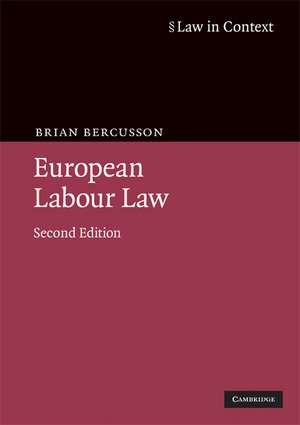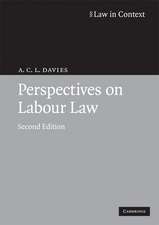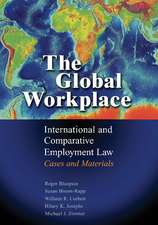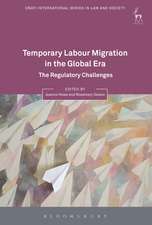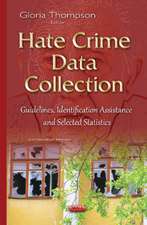European Labour Law: Law in Context
Autor Brian Bercussonen Limba Engleză Paperback – 8 iul 2009
Din seria Law in Context
-
 Preț: 230.49 lei
Preț: 230.49 lei -
 Preț: 396.47 lei
Preț: 396.47 lei -
 Preț: 231.05 lei
Preț: 231.05 lei -
 Preț: 315.01 lei
Preț: 315.01 lei - 9%
 Preț: 699.67 lei
Preț: 699.67 lei -
 Preț: 416.21 lei
Preț: 416.21 lei -
 Preț: 234.79 lei
Preț: 234.79 lei -
 Preț: 230.06 lei
Preț: 230.06 lei - 14%
 Preț: 869.10 lei
Preț: 869.10 lei -
 Preț: 231.76 lei
Preț: 231.76 lei -
 Preț: 321.38 lei
Preț: 321.38 lei -
 Preț: 274.34 lei
Preț: 274.34 lei -
 Preț: 314.81 lei
Preț: 314.81 lei -
 Preț: 278.81 lei
Preț: 278.81 lei -
 Preț: 233.26 lei
Preț: 233.26 lei - 9%
 Preț: 663.35 lei
Preț: 663.35 lei -
 Preț: 395.99 lei
Preț: 395.99 lei -
 Preț: 317.27 lei
Preț: 317.27 lei -
 Preț: 388.95 lei
Preț: 388.95 lei -
 Preț: 380.93 lei
Preț: 380.93 lei -
 Preț: 267.63 lei
Preț: 267.63 lei - 9%
 Preț: 697.36 lei
Preț: 697.36 lei -
 Preț: 201.95 lei
Preț: 201.95 lei - 14%
 Preț: 826.72 lei
Preț: 826.72 lei -
 Preț: 353.89 lei
Preț: 353.89 lei -
 Preț: 267.88 lei
Preț: 267.88 lei - 14%
 Preț: 701.93 lei
Preț: 701.93 lei - 11%
 Preț: 495.94 lei
Preț: 495.94 lei -
 Preț: 334.96 lei
Preț: 334.96 lei - 11%
 Preț: 497.03 lei
Preț: 497.03 lei -
 Preț: 447.63 lei
Preț: 447.63 lei - 11%
 Preț: 567.59 lei
Preț: 567.59 lei - 11%
 Preț: 422.74 lei
Preț: 422.74 lei -
 Preț: 453.38 lei
Preț: 453.38 lei - 11%
 Preț: 607.85 lei
Preț: 607.85 lei -
 Preț: 401.19 lei
Preț: 401.19 lei -
 Preț: 361.16 lei
Preț: 361.16 lei - 11%
 Preț: 581.08 lei
Preț: 581.08 lei -
 Preț: 286.30 lei
Preț: 286.30 lei - 11%
 Preț: 687.20 lei
Preț: 687.20 lei -
 Preț: 394.81 lei
Preț: 394.81 lei
Preț: 613.77 lei
Preț vechi: 689.63 lei
-11% Nou
Puncte Express: 921
Preț estimativ în valută:
117.45€ • 121.16$ • 98.01£
117.45€ • 121.16$ • 98.01£
Carte tipărită la comandă
Livrare economică 26 martie-09 aprilie
Preluare comenzi: 021 569.72.76
Specificații
ISBN-13: 9780521613507
ISBN-10: 0521613507
Pagini: 764
Ilustrații: black & white tables
Dimensiuni: 175 x 247 x 36 mm
Greutate: 1.5 kg
Ediția:Revizuită
Editura: Cambridge University Press
Colecția Cambridge University Press
Seria Law in Context
Locul publicării:Cambridge, United Kingdom
ISBN-10: 0521613507
Pagini: 764
Ilustrații: black & white tables
Dimensiuni: 175 x 247 x 36 mm
Greutate: 1.5 kg
Ediția:Revizuită
Editura: Cambridge University Press
Colecția Cambridge University Press
Seria Law in Context
Locul publicării:Cambridge, United Kingdom
Cuprins
Section I: Labour Law and Europe; Part I. European Labour Law: 1. European labour law and the social dimension of the European Union; 2. EU labour law and the UK; 3. The conceptualization of European labour law; Part II. History and Strategies of European Labour Law: 4. Shifting strategies 1951–1986: ECSC, EEC, harmonisation, financial instruments, qualified majority voting; 5. The strategy of European social dialogue; 6. The European Employment Strategy, the open method of coordination and the 'Lisbon Strategy'; 7. The strategy of fundamental rights: the EU Charter of Nice 2000 and a 'constitutional' strategy; Section II: The Structure of European Labour Law; Part III. Labour Law and the European Social Model: 8. The institutional architecture of the European social model; 9. A framework of principles and fundamental rights for European collective labour law; 10. A framework of principles and fundamental rights for European individual employment law; 11. The European Court of Justice, the EU Charter of Fundamental Rights and the European social model; Part IV. Enforcement of European Labour Law: 12. General principles of enforcement of European labour law; 13. Administrative enforcement of European labour law; 14. Implementation and enforcement of European labour law and employment policy through the social partners at national and EU levels; 15. Individual judicial enforcement of European labour law; 16. Euro-litigation: collective judicial enforcement of European labour law; Part V. The European Social Dialogue: 17. The European social dialogue: from dynamism to benign neglect 1993–2008; 18. External and internal scrutiny of the democratic legitimacy of the European social dialogue; 19. Threats and challenges to and the future of the European social dialogue; Section III: The Futures of European Labour Law; Part VI. Agendas and Visions of European Labour Law: 20. The futures of European labour law: (1) The Commission's agenda – 'modernisation'; 21. The futures of European labour law: (2) The European Court's agenda and ordre communautaire social; 22. The futures of European labour law: (3) The agenda of the Member States and of the European Parliament – the Lisbon Treaty and after.
Notă biografică
Descriere
This extensively updated second edition explores how individual European labour law systems combine to produce a distinctly European transnational system.
